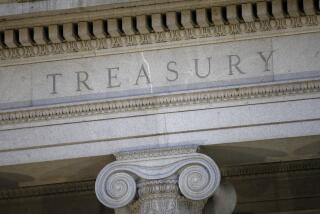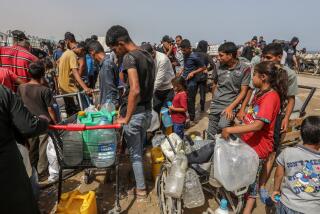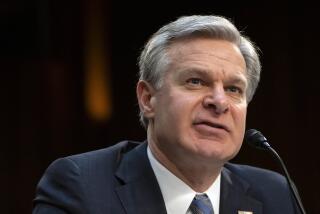U.S., Italy Act Against Terror Suspects
WASHINGTON — The United States and Italy acted in concert Thursday to freeze the assets of 25 individuals and financial entities with alleged ties to the Al Qaeda terrorist group.
The joint offensive was the biggest collaborative effort of its kind, U.S. officials said, and came amid growing concern about a perceived lack of progress in cutting off the flow of funds to terrorists.
“Today’s action makes clear that we are serious about shutting down any company or organization that is in the business of supporting terrorism,” Treasury Secretary Paul H. O’Neill said.
The U.S. and Italy issued blocking orders that require commercial banks to search for assets belonging to the individuals and entities and to freeze any they find.
The list includes 11 people associated with the Salafist Group for Call and Combat, described by U.S. officials as “a lethal terror group” with ties to Al Qaeda. The other 14 are entities owned or controlled by Ahmed Idris Nasreddin and Youssef Nada, both of whom have been accused of bankrolling terrorists.
The action increases to 234 the number of people and organizations placed on an international roster of alleged terrorist financiers following the Sept. 11 attacks on the U.S.
So far, the U.S. and other countries have frozen more than $112 million in assets, Treasury officials said. But most of the actions have been initiated by Washington, and the campaign seems to have slowed in recent months.
A United Nations monitoring panel has written a draft report that says the asset seizures have failed to dry up financing for Al Qaeda, the militant Islamic network accused of orchestrating the Sept. 11 attacks.
“Al Qaeda continues to have access to considerable financial and other economic resources,” the panel said in the draft report. It characterized the group as “alive and well and poised to strike again how, when and where it chooses.”
U.S. officials disputed the critical assessment of the asset seizure program, a central element of President Bush’s response to the Sept. 11 attacks.
“No one has claimed that the work is yet complete, and we have always said this would be a long-term effort,” U.S. Ambassador John D. Negroponte told reporters at the U.N. “I would not accept the proposition that these efforts have stalled.”
Treasury officials said Thursday’s action was significant because it was the largest asset-freezing operation to date involving collaborative efforts by several countries. In addition to the U.S. and Italy, Luxembourg and the Bahamas participated in the effort.
“All four of those nations provided financial information, investigative assistance or key documents or support, which allowed us to make the case necessary for today’s designation,” said Jimmy Gurule, Treasury undersecretary for enforcement.
Of the 16 asset seizures undertaken since Sept. 11, only a handful have resulted from collaboration with other governments.
Treasury officials said the slower pace of asset seizures in recent months is not an accurate indicator of the campaign’s progress. They said they have significantly restricted the flow of funds to terrorist groups, which is more important than adding new names to the U.N. list.
“We are confident that our efforts are having real-world effects,” Gurule said. “Al Qaeda and other terrorist organizations are suffering financially ... [and] potential donors are being more cautious.”
The men added to the list were identified as Adel Ben Soltane, Nabil Benattia, Yassine Chekkouri, Riadh Jelassi, Mehdi Kammoun, Samir Kishk, Tarek Maaroufi, Abdelhalim Hafed Remadna, Mansour Thaer, Lazhar Ben Mohammed Tlili and Habib Waddani.
U.S. officials said all 11 men are associated with the Salafist Group, a separatist faction of the Algerian-based Armed Islamic Group, and have been active in Italy and other European countries.
The 14 entities are part of the holdings of Nada and Nasreddin, both of whom were already on the list of alleged financiers. U.S. officials said the men have worked together for many years and exercise control over Bank Al Taqwa and Akida Bank, shell companies that share the same postal address in the Bahamas.
*
Times wire services contributed to this report.
More to Read
Sign up for Essential California
The most important California stories and recommendations in your inbox every morning.
You may occasionally receive promotional content from the Los Angeles Times.










